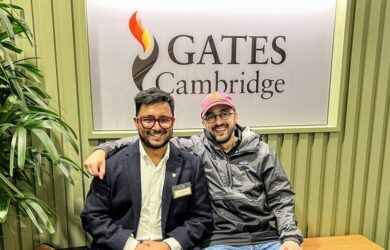The Vice Chancellor and Chancellor of the University of Cambridge and the Provost of the Gates Cambridge Trust will speak at this week's internal symposium for the first time.
The Vice Chancellor and Chancellor of the University of Cambridge and the Provost of the Gates Cambridge Trust will speak at a Gates Cambridge internal symposium for the first time next week.
The Vice-Chancellor Sir Leszek Borysiewicz will talk about his role, the Chancellor Lord Sainsbury will speak about his charity the Gatsby Foundation and the Provost Professor Barry Everitt will talk about his neuroscience research, specifically memory plasticity, at the symposium on 28th November.
Also making presentations on their research will be three Gates Cambridge Scholars.
Matthew Timothy Shafer [2013], who is doing an MPhil in Political Thought and Intellectual History, will speak about how definitions of democracy usually rest on the idea of a government being able to be changed without violence. However, he will argue that that definition relies on a narrow concept of physical violence and ignores structural violence embodied in particular kinds of social processes. He says this structural violence can shape the unfolding of government transitions even in the absence of physical violence and bloodshed. He argues: “If we want to be able to identify ‘democracy’ with non-violent domestic political arrangements, we must reject the minimalist conception in favour of some much fuller theory of well-ordered social institutions.”
Kavita Ramakrishnan [2009], who is doing a PhD in Geography, will talk about her research on a resettlement colony in Delhi which came about after people were forcibly evicted from slums in the city and resettled at its margins. Although the resettlement began in 2004, the colony grew substantially in the lead-up to the 2010 Commonwealth Games. She says those who have been resettled suffer from lack of infrastructure and insecure employment opportunities. She says: “My research critiques the ongoing eviction of the poor from cities such as Delhi and provides valuable insights into the heightened forms of poverty developing on the urban margins.”
Luning Sun [2010], who is doing a PhD in Social and Developmental Psychology, will talk about his research into emotion recognition impairment in patients who have suffered brain injury. His study is based on a large sample consisting of 194 brain injury patients and 194 normal controls collected in the UK and Ireland and aims to investigate how brain injury affects patients’ ability to recognise basic emotions in facial expressions, with fear being the hardest to identify. The research suggests different mechanisms may be involved in recognising emotions and looks at how adaptive testing can be developed to improve brain function in this area.
*The internal symposium takes place on 28 November from 3:00-5:00 in the Gates Cambridge Scholars Common Room. It is open to Gates Cambridge Scholars and their guests.












